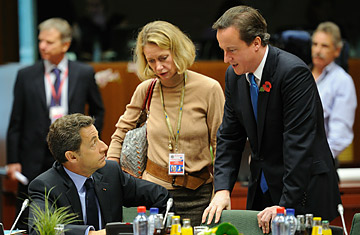
French President Nicolas Sarkozy (L) talks with British Prime Minister David Cameron (R) prior to a working session on the second day of a European Union summit on October 29, 2010 at the European Council headquarters in Brussels.
Ever since he became Britain's Prime Minister in May, David Cameron has been repeating a mantra about cutting costs across the board. These forbidding times, he argues, compel the country to tighten its collective belt if it is ever to nurse its bruised economy and strained public finances back to health. Just last week, this creed was reflected in the announcement of a grisly austerity package that sliced an average of 19% from the budgets of government departments, saving the nation £7 billion ($11 billion).
Now Cameron has taken his mission to Europe. At a two-day summit in Brussels, which ended Friday, he attempted to rally his fellow leaders to cap the European Union's budget for next year. He variously described as "reckless," "senseless,", "irresponsible" and "crazy" plans by the European Commission and the European Parliament to raise this year's €124 billion ($172 billion) budget by 6% in 2011. The bump in the budget—which was justified as reflecting the E.U.'s growing responsibilities—would pay for various measures such as farm aid, transportation networks and research programs.
During the summit, Cameron nimbly defended his position. Told by European Parliament President Jerzy Buzek that rejecting the 6% rise would make Cameron "anti-European," the Prime Minister replied: "I have had to cut the police force; that does not mean I am anti-police." At which point, German Chancellor Angela Merkel chimed in: "I'm cutting the German budget. Am I anti-German?"
By the end of the meeting, British officials trumpeted that Cameron had scored a major triumph by securing support from 12 other member states for his austerity campaign. That involved persuading both Merkel and French President Nicolas Sarkozy to sign a letter dismissing the 6% rise and calling instead for a more modest hike of 2.9%. Cameron said his intervention had shifted the spotlight to "reining in the excesses of the E.U. budget."
At first glance, this looks like an impressive result for a novice prime minister at only his third E.U. summit—and one whose Euroskeptic leanings were assumed to leave him with little influence on his fellow leaders.
However, dig a little deeper and questions arise. Fact is, two weeks before the summit, Cameron had pledged to fight for a budget freeze or even a cut. So his embrace of the 2.9% rise now looks like a partial retreat. Especially to the more trenchant Euroskeptics in his Conservative Party, who tend to see the E.U. as an excuse to force Britain to pay for worthless European projects.
Earlier this week, former party chairman Lord Tebbit indelicately compared Cameron's stance to France's 1940 cave-in to the Nazis, saying the Prime Minister would be guilty of a "Vichy-style" surrender unless he said no to any increase in the budget. At his final summit press conference, Cameron was asked if he saw himself as a Euroskeptic. He said he does, but added: "Obviously a practical, sensible and reasonable one at the same time."
Perhaps more damningly for Cameron's vaunted act of diplomacy is the fact that most E.U. finance ministers had already called for the 2.9% budget rise over the 6% hike as long ago as July. So for all his efforts to co-opt his fellow leaders, Cameron had merely persuaded Merkel, Sarkozy and the others to sign up to a position they had already established.
And how much did Cameron's crusade actually save, anyway? Contrary to popular belief in Britain, the E.U. budget is relatively small: Over the period of 2007-2013, it has been set at just 1.05% of the E.U.'s gross national income. A 6% rise would boost the annual E.U. budget from nearly $172 billion this year to more than $182 billion in 2011. For British taxpayers, the difference between the proposed rise and the 2.9% the E.U. ended up with amounts to just $696 million.
Nor is the E.U. being profligate: Over the past 10 years, national budgets in Europe have gone up by 4.9% a year on average, while the E.U. budget has gone up by 3.2%, despite seeing its membership rise from 15 to 27 states.
All this leaves Cameron's campaign looking more like a symbolic gesture to bolster the austerity drive in the U.K., says Philip Whyte, Senior Research Fellow at the London-based think tank the Center for European Reform. "The size of the E.U. budget is peanuts. But whatever the reasons—good or otherwise—to raise the E.U. budget, it is a difficult sell back home," Whyte says. "Unfortunately, the substance in this issue is often overlooked in Britain, where political debates on Europe are generally reduced to an 'us and them' approach."
As for the rest of the E.U. summit, Cameron's display of his austerity credentials was a sideshow to the main point of the meeting: How to rewrite the E.U. rules to ensure that there is no repeat of the Greek debt crisis.
On this, the leaders agreed to a limited redrafting of the E.U. treaty to insert new rules on sanctions for eurozone budget busters. This might have put Cameron in an awkward spot since he had pledged last year a referendum on any treaty change that transfers power to Brussels. But he deftly dodged this potential landmine by arguing no such vote was needed because the changes only affected the 16-member eurozone, of which the U.K. is not a member.
So Cameron could at least claim he had, in time-honored British tradition, saved money, while ceding nothing in sovereignty. Whether his efforts really changed the minds of any fellow E.U. leaders, or even saved much for the British taxpayer, is another matter.
